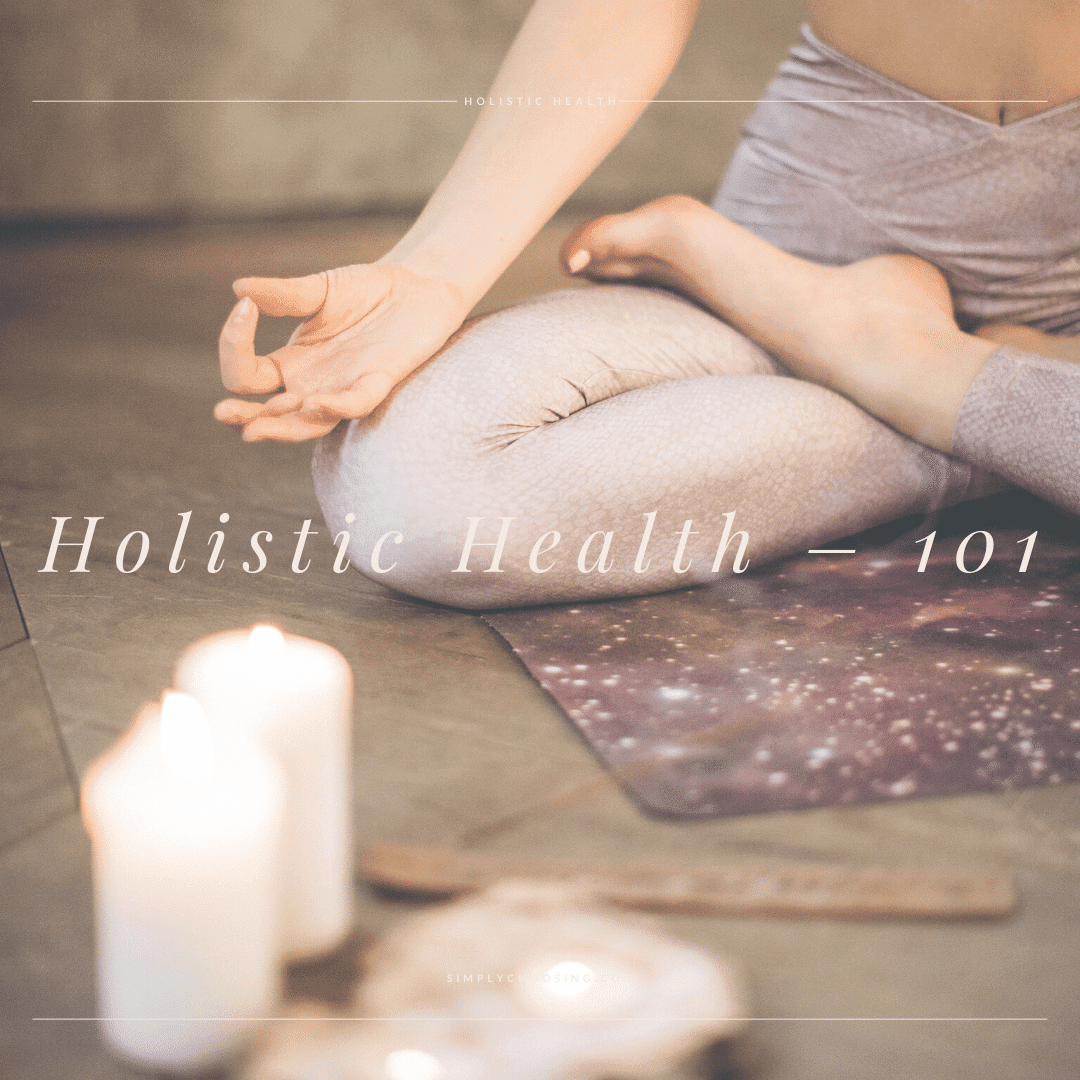Disclosure: Please note that this post may contain affiliate links, meaning that I get a commission if you decide to make a purchase through my links, at no cost to you. Please refer to my Privacy Policy for more information.
What will you get from this blogpost:
- Develop a basic understanding of what holistic health is.
- Understand how your body is connected to everything.
- Learn why a holistic approach is essential to your overall well-being and how you can incorporate little lifestyle changes.
What does Holistic Health mean?
You’ve probably been to a doctor before to treat an illness or a broken wrist. If so, there’s a good chance you’ve been prescribed medications that could potentially numb the pain or even heal that particular area of your body. However, in many cases, these prescribed medications can have side effects and cause further complications.
Don’t get me wrong, there are cases where these medications do help improve your overall health. However, if not treated holistically, some of them can make things even more complicated. This is because our body, mind, and spirit are intimately connected.
Imagine the following:
You have a car with a warning sign telling you to take it in for its annual car service. You ignore it. Well, in most cases, it’s okay to just occasionally fix what’s broken.
This week it might be a light bulb, the next an empty oil tank. But before long, you’ll find that other areas of your car are slowly but surely breaking down. And why?
Because all the pieces that are part of the car are interconnected to keep it running smoothly. If one part isn’t working the way it should, other dependent pieces will struggle to function properly. Well, this is where holistic health comes in.
“ When you touch the body, you touch the whole person, the intellect, the spirit, and the emotions.”
– Jane Harrington
Holistic health is an approach to life.
When a person is treated holistically, it means that not only a particular disease or part of the body is considered, but the whole person – body, mind, and spirit. This means that to be truly healthy, both internally and externally, all the connecting wires must be in harmony. Your:
- Body – through proper nutrition and exercise that keeps you energized and strong;
- Mind – through mental practices that relax your mind and control your emotions;
- Spirit – through the right methods and energy work that refuel you from the inside out.
When everything is in tune and harmony, we can speak of a holistically healthy individual.
A holistic approach is closely linked to alternative therapies such as
- Nutrition
- Energy work
- Acupuncture
- Yoga
- Meditation
In most cases, a combination of such therapies and methods can heal a person on a deeper level and support a joyful and truly healthy life.
Why is Holistic Health so important?
It’s no secret that the world is full of toxins. All the nutrient-poor foods we consume, the chemically-produced cosmetics we smear on our faces every day, the polluted streets that fill our lungs with toxins, just to name a few.
In addition, while life expectancy today is rather high, people are exposed to much higher levels of stress than ever before. In a fast-paced age where jobs and careers demand our full attention, personal health care can easily be forgotten or left behind. A quick fix is just better, right?

In reality, this sort of “quick fix” often leads to chronic diseases that could have been avoided in the first place. These illnesses can range from depression to uncontrolled weight gain or loss to chronic heart disease that could end up fatal.
The 4 Interrelated Parts of Holistic Health
When it comes to holistic health, we look beyond our physical bodies and address the whole:
- Physical
- Emotional
- Mental
- Spiritual
Physical
What comes to mind when you think of health? Usually, when people think of health, they refer to our physical health. This is because our physical body is the one that shows us the first signs and symptoms of abnormalities, whether they are physical, emotional, mental, or even spiritual. Physical health is also the one that is easier to track and measure. However, physical illness and chronic pain can be a much deeper scar.
For your physical health, you can improve your quality of life by making the following lifestyle changes:
Adequate sleep
Make sure you get 7-8 hours of sleep each night. A sleeping mask can sometimes work wonders.
A nutrient-rich diet
Ensure that your diet is high in plant-based, organic foods.
A rich source of protein
Try to include beans in your diet to help maintain blood sugar levels, lower cholesterol and increase your gut bacteria.
Exercise
Move your body for at least 30 minutes a day. Whether you go for a walk or hit the gym, just get your blood pumping.
Cut down on processed foods
Reduce your consumption of processed foods such as potato chips, prepared salad dressings, fried and greasy foods, etc.
Stop smoking and alcohol consumption
Ideally, you should quit smoking and drinking alcohol. If that is not possible, reduce them to a minimum.
Emotional
When someone suffers from abnormal physical health problems for which there is no “cure”, it can often be due to emotional reasons. Emotional health is about being aware and accepting of your feelings and how you process them.
Unfortunately, our emotional well health is often neglected. Yet our emotional health is one of the most important parts to take care of because if it is not in optimal shape, it can be the cause of many physical health problems.
On an emotional level, you can improve your quality of life by making the following lifestyle changes:
Practice mindfulness
Incorporate meditations, breath-works, guided imagery, and other practices that ease and relax your mind in your life.
Start journaling
Keep a diary with you to record how you are feeling during the day or start writing down your emotions in a five-minute journal each morning and evening.
Seek counsel
If you feel like you’re drowning and nothing helps, seek counsel. That could be a therapy of any kind.
Mental
Mental health is about the functioning of your brain. In this sense, it has similarities to your emotional health but also includes your intellectual, spiritual, and social health. Among other things, your mental health determines how you make decisions, interact with others and, most importantly, handle stressful situations.
Your mental health can improve by making the following lifestyle changes:
Active learning
Always keep your mind active by learning new things. This could be a new language, a new task or skill, or simply reading a book to expand your intellectual abilities.
Nutrient-rich diet
Focus on plant-based foods high in antioxidants and omega-3 fatty acids, reduce inflammation and support your cognitive function.
Smoking and alcohol consumption
Smoking and alcohol consumption is also bad for your mental well-being. Try to quit smoking and excessive alcohol consumption.
Gut health
Improve your gut health with gut-healing foods like bone broth, as well as prebiotic and probiotic foods. The mind-gut connection is real. So if you want to be mentally healthy, you need to take good care of your gut.
Spiritual
Though spirituality is more accepted today, it remains a misunderstood concept in many circles. Being spiritual does not necessarily mean being religious. Rather, it means being in tune with your inner self – your spirit – and believing in a greater, divine power that can give you more than any human sensory experience.
Spiritually, you can improve the quality of your life by making the following lifestyle changes:
Let nature guide you
Take a walk in the forest. A walk in nature or what the Japanese call “shinrin yoku” or forest bathing is a way to connect with divine energy. It is known to heal you.
Practice meditation
Even a few minutes of daily meditation can heal you spiritually by giving you an inner stillness and peace that does not depend on external circumstances. It gives you the power to feel who you are on a spirit level.
Prayer
If you are religious and associate spirituality with your religion, pray.
As you now know, holistic health involves not just the physical body but also the mental and spiritual aspects of your health. You learned that all three areas are interrelated and work together harmoniously. You’ve also understood why a holistic lifestyle is vital to you and your well-being.
This week’s challenge:
Maybe you’ve come a long way with your mental health, but you’re still coming up short on your spiritual or emotional health.
Whatever it is, try at least one of the above lifestyle changes this week and I promise, you will notice a difference.
I’d love to hear from you about the lifestyle changes you’ve made and how they’ve improved your overall health and well-being!



0 Comments